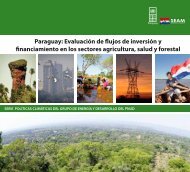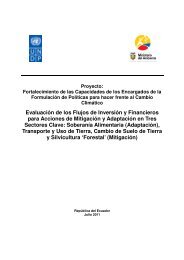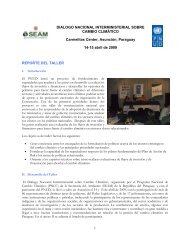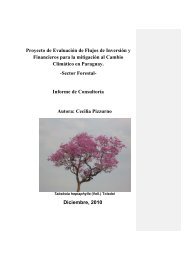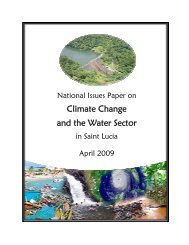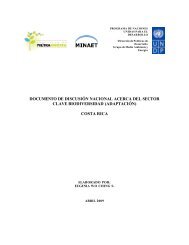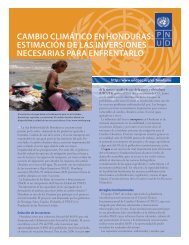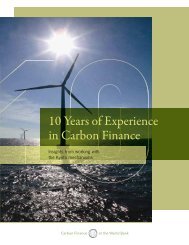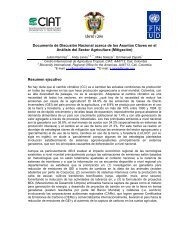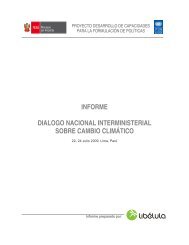national interministerial dialogue on climate change - UNDPCC.org
national interministerial dialogue on climate change - UNDPCC.org
national interministerial dialogue on climate change - UNDPCC.org
You also want an ePaper? Increase the reach of your titles
YUMPU automatically turns print PDFs into web optimized ePapers that Google loves.
Day 2<br />
Review of Day 1 results<br />
The facilitator presented the recommendati<strong>on</strong>s <strong>on</strong> improving <str<strong>on</strong>g>nati<strong>on</strong>al</str<strong>on</strong>g> activities in the c<strong>on</strong>text of<br />
<strong>climate</strong> <strong>change</strong>, which resulted from the discussi<strong>on</strong>s <strong>on</strong> the first day of the workshop:<br />
• To establish cooperati<strong>on</strong> am<strong>on</strong>g departments and <strong>org</strong>anizati<strong>on</strong>s for a joint data analysis and<br />
assessment of expenses and profits from the greenhouse gas emissi<strong>on</strong>s c<strong>on</strong>trol (increased<br />
energy efficiency, energy c<strong>on</strong>servati<strong>on</strong>, minimizati<strong>on</strong> of technological natural gas losses, etc.).<br />
To create an instituti<strong>on</strong>al mechanism for interdepartmental coordinati<strong>on</strong><br />
o Establishment of sectoral groups to develop a greenhouse gas inventory in the<br />
sectors<br />
• Capacity building of policy makers <strong>on</strong> key negotiati<strong>on</strong> issues prior to the c<strong>on</strong>ference of parties<br />
and to develop a <str<strong>on</strong>g>nati<strong>on</strong>al</str<strong>on</strong>g> programme <strong>on</strong> <strong>climate</strong> <strong>change</strong> (participati<strong>on</strong> of Turkmenistan in the<br />
United Nati<strong>on</strong> Framework C<strong>on</strong>venti<strong>on</strong> <strong>on</strong> Climate Change) involving key sectors of the<br />
<str<strong>on</strong>g>nati<strong>on</strong>al</str<strong>on</strong>g> ec<strong>on</strong>omy<br />
• To integrate the above programme into the Nati<strong>on</strong>al Programme of Social and Ec<strong>on</strong>omic<br />
Development up to 2020<br />
o Assessment of expenses, profits and sources of financing (including future<br />
mechanisms of agreement <strong>on</strong> <strong>climate</strong> related problems after 2012) – ec<strong>on</strong>omic<br />
analysis of profits and expenses of different enterprises as far as c<strong>on</strong>sequences of<br />
<strong>climate</strong> <strong>change</strong> are c<strong>on</strong>cerned<br />
o Objective: to reduce the carb<strong>on</strong> intensity of the ec<strong>on</strong>omy and to take adaptati<strong>on</strong><br />
acti<strong>on</strong>s<br />
o Elaborati<strong>on</strong> of methods and amendments to the statistical reporting forms. The<br />
amendment suggesti<strong>on</strong>s should be sent to the State Statistical Agency. Guidelines<br />
should be worked out for individual sectors that would make it possible to report<br />
under the UNFCCC at inter<str<strong>on</strong>g>nati<strong>on</strong>al</str<strong>on</strong>g> level (including the new agreement after 2012)<br />
o Accounting and gradual reducti<strong>on</strong> of specific natural gas c<strong>on</strong>sumpti<strong>on</strong> <strong>on</strong><br />
technological pipeline maintenance<br />
o Development of the Caspian coastal area plan taking into account the principles of<br />
sustainable development as well as greenhouse gas emissi<strong>on</strong>s assessment<br />
• To use encouraging mechanisms<br />
o<br />
Administrative acti<strong>on</strong>s (removal of administrative barriers impeding the energy<br />
c<strong>on</strong>servati<strong>on</strong> as well as different financing of state enterprises when the energy/funds<br />
saved are transferred to the next financial year or used for their own needs)<br />
o Rewards<br />
o Fiscal acti<strong>on</strong>s (in the l<strong>on</strong>g term), gradual adjustment of the electricity and gas tariffs to<br />
the market <strong>on</strong>es<br />
o Claims to foreign companies regarding energy efficiency and gas c<strong>on</strong>sumpti<strong>on</strong> rates<br />
• Educati<strong>on</strong>al acti<strong>on</strong>s<br />
o To prepare populati<strong>on</strong> for the gradual adjustment of the electricity and gas tariffs to<br />
the market <strong>on</strong>es<br />
o Awareness of electricity and gas c<strong>on</strong>servati<strong>on</strong><br />
o School course <strong>on</strong> the ecologically sustainable lifestyle<br />
• To adapt existing sectoral projects to the CDM participati<strong>on</strong>.<br />
Land-use, land-use <strong>change</strong> and forestry<br />
A. Kokorin presented the main c<strong>on</strong>cepts and the terms applied in the sector of land-use, land-use<br />
<strong>change</strong> and forestry,, a course of inter<str<strong>on</strong>g>nati<strong>on</strong>al</str<strong>on</strong>g> negotiati<strong>on</strong>s and problems relevant to LULUCF<br />
projects in terms of the Joint Implementati<strong>on</strong> and the Clean Development Mechanism. Besides, the<br />
lecturer marked the key LULUCF problems c<strong>on</strong>sidered within the Bali Acti<strong>on</strong> Plan, and advantages of<br />
Sylvan projects.<br />
5




